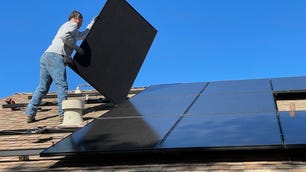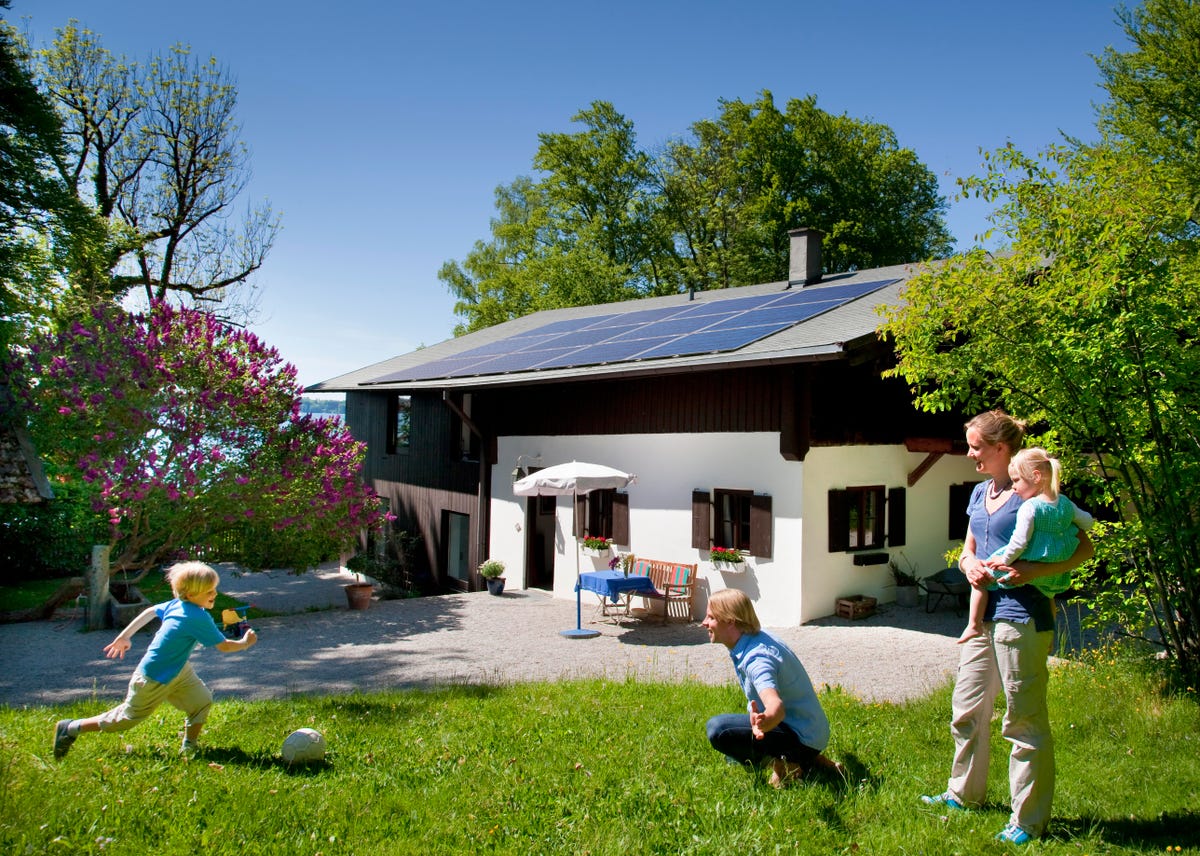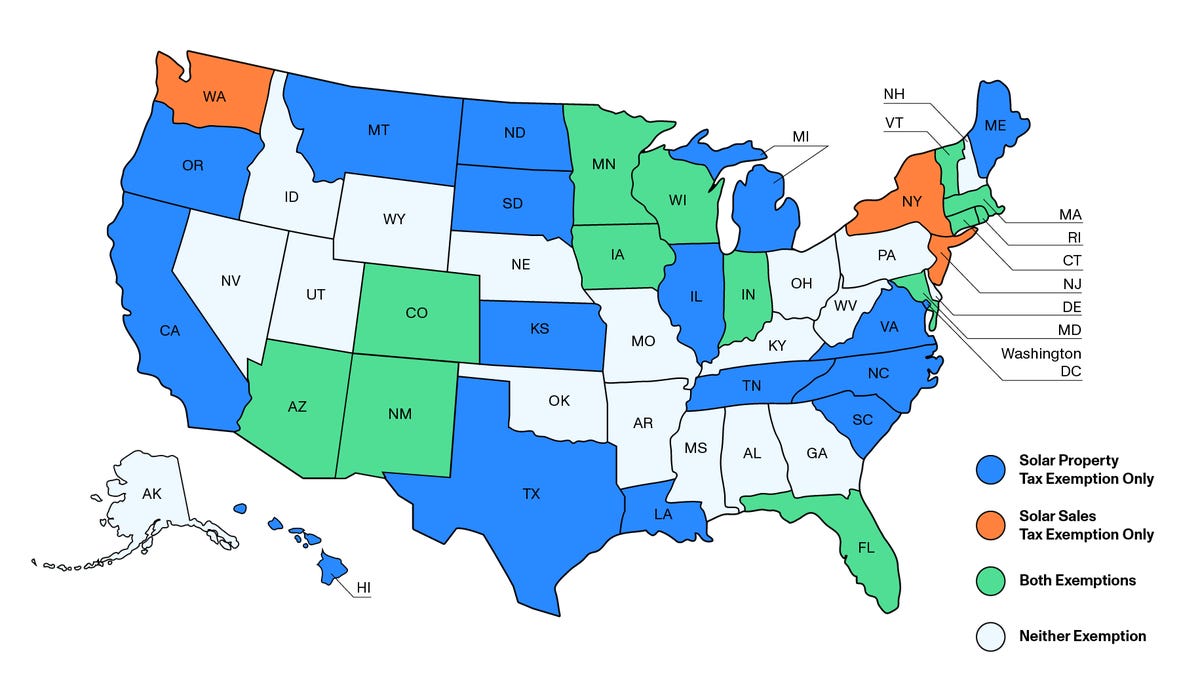Calculate how much you can save with solar panels




For many, installing solar panels on the roof is attractive because it reduces energy bills and saves money.
However, upfront installation costs, incentives, tax breaks, and other considerations can make the decision to go solar quite complicated. The math behind how much money solar panels can save you takes some time to figure out.
Gilbert Michaud, a professor of environmental policy at Loyola University Chicago, said it’s worth looking at available solar options now. “It makes a lot of financial sense because the costs have come down so much and the incentives are really strong,” Michaud said.
Residential solar is a customized product, however. To determine how much you can save, it is important to make sure you consider all the factors that affect your unique situation.
Long term solar savings
For most people, installing solar is a medium to long-term investment. A payback period is the time it takes to recoup your initial investment through monthly energy savings. How much you save per month depends on the size of your solar system, your home’s energy usage, and other factors. Typically, excess solar energy produced by a residential system is credited against the amount used, but it’s rare that you’ll actually receive cash payments for solar.
Still, paying little or nothing to your local utility can add up to big savings over years or decades. “Most systems pay for themselves in about 10 years. After that, you have free electricity for decades,” Michaud explains. He notes that some younger homeowners who move more often may dismiss solar because of the perceived long commitment.
However, he points out that the investment can often be recouped through the increase in home value that comes with a new installation. The payback period will be unique to your circumstances because of the difference in both the initial solar cost and the energy costs based on your location. But here are some guidelines to help you estimate when you’ll break even.

The remainder is strictly speaking savings after the solar panels have saved enough to pay for themselves.
How to Estimate Your Solar Energy Savings
There is a simple, basic formula to determine how long it will take for your solar savings to pay for the cost of installing the system. Start with the initial cost of installation, then subtract any tax credits, rebates, subsidies, and other incentives you may have received. This will give you your net system cost. Then estimate how much the system will save you on your annual electric bill.
Divide the net system costs by the annual savings and you will get the payback period of your solar energy system in years.
Here it is explained in a bit more detail:
Find out your initial costs
When making a major purchase such as solar panels on your roof, it is important that you request multiple quotes, that you are sure that the installer answers all your questions and that you find the offer that best suits your needs.
Deducting tax benefits (and other incentives)
While tax credits and incentives vary by state and utility, the 30% federal solar tax deduction applies to everyone. Figure out how much you can expect to reduce your solar costs and deduct it.
Check your monthly savings on your electricity bill
You might assume that you’ll get all of your power from solar, but while some homes can zero out their electric bills, others still have to pay for a portion of their electricity usage or standard fees. Some utilities charge you just to stay connected to the grid. Savings vary widely from home to home, depending on the number of solar panels installed, typical energy usage, and more.
Look at your electric bill—at least six months to account for seasonal temperature changes and other cost fluctuations—and estimate your monthly savings from solar. If you cover 100% of your bill with solar and net metering and you currently pay an average of $125 per month in electric bills, you could save $1,500 per year ($125 x 12 months).
Calculate your payback period
Once you have calculated your annual savings, you can calculate your payback period by dividing the net cost of your system by your annual savings. A system that costs $15,000 and saves you $1,500 each year will pay for itself in 10 years.
Here is the equation written out:
(Cost of installing solar panels – tax credits and other incentives) / (Annual savings) = Payback period in years
Calculate your solar savings
After your payback period, where you’re essentially just recouping your costs, all that’s left is savings. Residential solar panels typically have a 25-year warranty, but their lifespan can be much longer. Fifteen years of savings at $1,500 per year is a whopping $22,500.
These calculations are a little too tidy for the real world. Even the most efficient solar panels become less productive over their lifetime, so you might not get as much energy out of them in year 25 as you did in year one (a typical warranty is between 85% and 92% of original output).
On the other hand, electricity rates have historically been rising fairly steadily. (They’re up about 50%) 2.5% from December 2022 to December 2023(according to the Bureau of Labor Statistics.) This means you could save even more in the future than you would now with solar energy.
Average cost of installing solar panels
Like many things, the price of having solar panels installed on your home has been affected by inflation and supply chain constraints in recent years. According to a report by Wood Mackenzie (PDF)The installation cost of residential solar panels was $3.28 per watt in the first quarter of 2023, up from $3.07 in the same period in 2022. (Though the report suggests the price may have fallen again.)
According to CNET sister site SaveOnEnergyThe average cost of a residential solar system in June 2023 was $31,558 before incentives and rebates, based on a typical solar system size of 8.6 kilowatts. The cost estimate is based on a dataset from Lawrence Berkeley National Laboratory that puts the average cost of a solar panel system at $3.67 per watt.
Below is the average cost of a solar panel system for most states, according to FindEnergy.com.
However, the cost of individual solar installations can vary. (Even large-scale estimates can vary by source, as you can see above.) Homeowners can opt for systems of various sizes, with more complexity and additional components, such as solar batteries and EV chargers, that drive up the total cost. Other considerations, such as local market conditions and the difficulty of installing solar panels on a particular roof or lot, can also affect the final price. And prices can vary by solar company.
Tax benefits and incentives
Thanks to the Inflation Reduction Act, the U.S. government will credit taxpayers with 30% of the cost of an installed solar system the following year. There are also numerous other incentives and tax breaks offered by states, local governments and individual utilities to further reduce the total amount paid out of pocket.

These are the states that will exempt solar panels from sales tax and property tax starting in 2023.
In addition to such reductions in initial installation costs, using your solar panels over the years can also lower your energy bills and help you repay your investment through net metering. This is the most popular way that utilities compensate homeowners who allow the energy their solar system produces to be fed into the grid for other consumers to use.
Factors Affecting Savings
In recent years, net metering policies have changed in some jurisdictions, such as the high-profile California case, and this has sometimes resulted in a reduction in the total potential savings from solar. For example, some utilities are moving to more complex formulas that determine how much homeowners get paid for releasing energy to the grid.
It is important to do your homework to understand your local utility’s net metering policies and any potential changes they are considering. You should also be aware of time-of-use rates, which may apply to how much the utility charges for energy use and pays for energy production during peak and off-peak hours.
In some cases, solar panels combined with a solar battery can save you more based on time of use than solar panels alone. Adding an electric vehicle charger is an additional expense, just like a battery, but it can increase your savings over time.
The climate and amount of peak sunlight your location receives can also be a major factor in how much you save over time. A state like New Mexico with a maximum of six peak sunlight hours per day will obviously allow you to generate more electricity, and potentially save more, than more northern states seeing 25% to 50% less peak sunshine.
Since solar panels can last up to 25 years, you need a sturdy roof. If your roof isn’t in great shape, you may need to replace it before installing solar panels. While you will eventually need to replace your roof whether you install solar panels or not, doing it early is an added expense that can eat into your savings.
Find solar grants in your state
Frequently Asked Questions
Are solar panels really worth it?
The best way to answer this is to do the math. If a solar system can save you more electricity over time than the net cost of installing it, then it is worth it economically.
Is it worth paying off solar panels?
Again, this comes down to the numbers. If you financed your solar system and are accruing interest on it, it may be beneficial to pay it off as soon as possible.
What are the biggest disadvantages of solar energy?
The central disadvantage is the initial cost of a solar installation. Of course, this is partially offset by numerous incentives, such as the federal tax deduction. Some people may also find solar panels to be a thorn in the side.





